There are few transport matters as complex as that of bulk shipping alcohol into and around the U.S. Laws are complicated, restrictive, and often confusing to get your head around. Sadly, a failure to do just that could leave you on the wrong side of the law in a significant way. Even worse, there’s no one-size understanding of what exactly is and isn’t legal when your package contains alcohol.
Complying with state and federal regulations plays an important role in your success or failure in shipping alcohol. There are also a number of best practices that should be followed. Working with a licensed and experienced logistics partner can ensure your success when shipping alcohol.
To make sure you’re successful, we’re going to discuss everything there is to know about shipping alcohol in bulk quantities.
First thing’s first; is it actually legal to ship alcohol? We’re sorry to say that even this question doesn’t have a cut and dry answer. In technical terms, alcohol shipments are legal so long as they’re made by companies who have the proper license to transport alcoholic beverages. That said, state laws tend to be different and some states. For example, states such as Alabama and Oklahoma, won’t allow you to ship alcohol directly to consumers at all. What’s more, there are sometimes limitations in place about the types of alcohol you can send. In states like these, it’s always best to check details ahead of time to avoid landing yourself in hot water.
It’s also worth noting that the U.S. postal service itself WILL NOT ship or transport alcohol of any kind. This shouldn’t be much of an issue given the quantities you’re carrying, but it’s worth remembering that you will require a private carrier for this process. To get things right every time, it’s also worth looking to companies with specific experience in alcohol shipments.
You might not think that shipping bulk quantities of alcohol would be any different from sending a bottle of wine, but that isn’t always the case. Admittedly, most states uphold the same rules irrelevant of the amount of alcohol you’re moving.
That said, shipping bulk quantities of alcohol isn’t always a good idea without checking any state limits first. In Alabama, for example, it’s not possible to send any more than five gallons of alcohol at a time. That’s for individuals with licenses.
Further states like Arizona have even stricter laws, especially for companies shipping alcohol straight to their consumers. Here, it’s illegal to ship more than two cases of wine per calendar year. There are also limitations in place in Arkansas, where only shipments containing one case of liquor are allowed per consumer in any calendar quarter. Restrictions like these will sometimes apply to you, even when you’re shipping inner state, so always double-check.
As is often the case with large shipments, you may also find that regulations are different depending on the amount of alcohol you intend to move. That's why you need to be sure of exactly how your quantities impact your legality.
With all that being said, the most common factor that comes into play when shipping alcohol is who the receiver of the shipment is. Business to business shipments of alcohol are far less policed than shipments that are delivered directly to consumers.
There are other kinds of alcohol that require special precautions when shipping. Learn more about how to ship isopropyl alcohol.
Even if you’re 100% certain that moving a bulk amount of alcohol is legal, you need to consider how exactly to go about alcohol shipments. Moving large quantities of anything is difficult, after all, especially something as potentially delicate and harmful as alcohol. An accident could be catastrophic indeed if it happened with bulk casements of liquor in the back of a truck.
Your first port of call should be to seek an experienced private shipping company. Making sure that you choose a freight company that knows how to handle alcohol for the utmost safety is absolutely necessary. We’ll discuss how to find the bulk alcohol transport company for you later.
You’ll also want to think about proper packaging for your alcohol. Again, we’ll go into detail on this point later, but taking time for this is vital. Even with the most skilled transport company, your bottles are unlikely to arrive at their destination if you don’t properly package your alcohol.
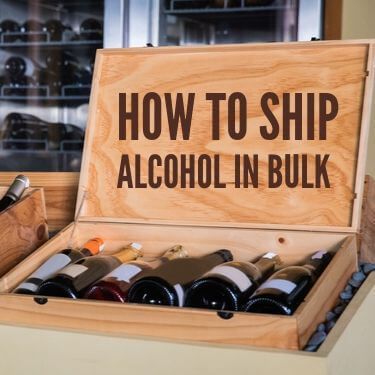
As we touched upon above, the regulations involved in transporting different kinds of alcohol can be steep. They include restrictions on amounts, the need for detailed documentation, and a separate law for every state. Yet, understanding each of these is vital for legal processes.
To even import alcohol into the U.S. itself, you’ll need to keep on the right side of the ATTB, the FDA, and the CBP by adhering to regulations that include -
For any alcohol that requires a specific temperature while being shipped, temperature guidelines will need to be followed. This isn’t regulated by any specific entity (unlike food with the FDA), but shippers and receivers will be keen to monitor the shipping temperature. Unexpected change in temperature while shipping can lead to spoiled goods upon arrival.
In the past, states have attempted to stop consumers buying directly from an out-of-state winery in any instance. Limitations like these apply to something called direct-to-consumer (DTC) transactions and are most relevant to online companies shipping wine straight to their consumers. Luckily, a 2005 ruling by a judge in Granholm v. Heald means that shipping wine across state lines is now possible. In fact, this is now about the easiest cross-state alcohol to handle.
It is worth noting that, despite changes for the better, many states still don’t permit retailer wine shipping. This can make it difficult for companies looking to sell wine in retail units once it arrives at its destination. That said, there are some allowances to this rule if you take the time to look for them. States like Nebraska and Connecticut, for example, are good bets for this type of shipment.
This can all sound rather confusing. Whatever your commercial intention for shipping wine, though, there are resources that can help you to understand applicable regulations. If you’re in doubt, it may also just be worth making a few phone calls within the state in question. It’ll soon become apparent whether your efforts are financially feasible or even legal.

The good news is that very few states produce wine, meaning that many are willing to consider imports, even though the regulations can seem impossible. By reaching out, explaining your product and providing the right paperwork, you may be able to seal a deal. That alone could see you starting your wine shipment efforts sooner rather than later.
While limited production could be your saving grace from a wine perspective, the same sadly doesn’t apply when it comes time to shipping beer across state lines. According to the Brewers Association, there are around 5,562 breweries across the U.S. already. As such, states often have a lot less incentive for allowing large shipments of beer. But, that doesn’t mean this is an impossible task.
While most states are open to wine shipments from elsewhere, only a handful of them allow for the importation of beer, while others only allow inner-state transportation. This is excellent news if you intend to keep business close to home, but it doesn’t always make it easy to grow your efforts. Even worse, regulations are kept frustratingly unclear.
There are also only seven states that allow DTC beer transactions and shipments like those discussed above, and they are -
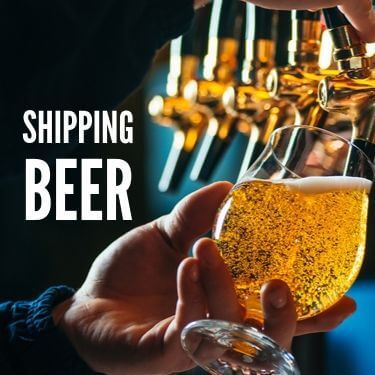
What’s more, only licensed retailers and distributors may transport beer in any way. If this is making your head spin, then you aren’t alone. There seems to be a great deal of uncertainty around the transportation of beer in particular. This is such an ongoing confusion for many companies that they decide instead to keep beer shipments within their home states.
Given that many of the restrictions in place involve issues around regulation, this simple step could see you bringing a real sense of ease to your shipment processes. If you’re able to build a reputation this way, you may even find that your inner-state efforts allow you to start branching out with a lot less hassle.
What’s more, the full range of brewery competition we mentioned at the start means that keeping things a little more local often makes more sense from a financial perspective, too.
Need freight shipping from New Hampshire to Florida? See how R+L Global Logistics can handle any commodity.
Much like beer, the rules around shipping liquor across the U.S. are also a little confusing at times. In fact, liquor shipment and sales seem to be even more complex than the beer regulations mentioned above. That’s because there’s surprisingly little information out there about specific state laws around this issue.
In large part, it seems that this is to keep liquor distribution local. In fact, the only real case study available surrounding this matter is that of the Pennsylvania Liquor Control Board (PLCB) and its work with UPS. This small segment of transparency has led to the successful shipment of liquor at least within Pennsylvania.
Yet, most companies are currently having to operate off guesswork and grey areas when it comes to their liquor shipments. The most famous instance of this originates from ‘Caskers,’ a company currently finding what’s been termed ‘the fourth tier’ of liquor sales. By acting as a marketing platform for various liquor companies, they’ve found a way to offer alcohol shipments without leaving themselves liable.
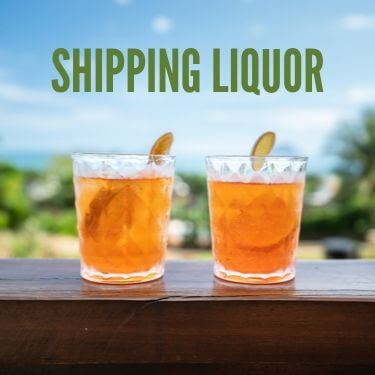
As you might be able to guess from these confused cases, your best chance at actually shipping liquor according to the law would be to turn to a shipment company with experience in this issue. They’ll be able to understand the requirements better than you, and should be able to point you towards some loopholes of your own. ‘
R+L Global Logistics has the knowledge and expertise required to handle liquor shipments across the entire U.S.
The rules for bulk shipments of whiskey are much the same as those discussed for liquor. In other words, they’re incredibly stringent and vary from state to state. By this time, you’ve probably realized that checking out different state laws is the best bet you’ve got, though we’re sorry to say it’s more liable a state won’t allow whiskey shipments than that it will.
The good news is that many companies are still managing to get around these setbacks. As with beer, you may find depending on your budget that it’s best to keep shipping whiskey within your state. Or, as with the case of ‘Caskers’ outlined above, you may find that there are grey areas from which you can build a sustainable shipment process.
Either way, hiring an experienced shipment team who can also take care of logistical issues like these is the best way forward.
As we touched upon at the beginning of this article, proper packaging is vital for making sure that you’re safely shipping alcohol. The question is, how exactly do you pack liquid in bulk?
This is very much dependent on your processes once your product reaches its destination state. If it’s going directly to consumers, or even to another wholesaler, you’re going to need to bottle it all up before you transport it. Bubble wrap, specifically-designed bottle carriers, and even an expert handling team can help everything to arrive in one piece.
And, bulk liquid transportation gets even easier if you have people on the other end who can get it ready for sale once it arrives. In this case, you might want to consider large-scale solutions like an ISO tank, which could carry up to 33,000 liters. Even the use of drums and barrels could see you managing to pack 250 liters per unit. Shipping solutions like these can make it a lot easier to transport more alcohol in less time, though you may need to check weight limits with your carrier before overloading your transport.
As you might imagine, there are plenty of documents necessary to shipping alcohol within the U.S., and many of them are hard to pin down due to their state-specific nature. As you may have guessed by now, every single state requires you to have a specific documented license before you can ship alcohol to those areas, with no room for error.
To keep this simple, though, let’s look at a document that every U.S. company needs for the safe and legal transportation of alcohol - a Federal Basic Importer’s Permit. This is a TTB requirement and is free and straightforward to obtain. To be eligible, you need to -
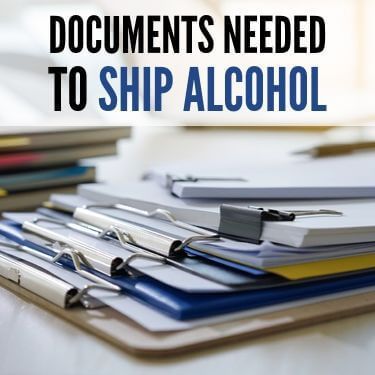
Trust us when we say that this is about the most straightforward document to get on your alcohol shipment journey. You’ll also need to seek a TTB-issued Certificate of Label Approval (COLA) for each alcoholic product you intend to transport. These are issued as proof that your products adhere to federal regulations, making state acceptance much more likely. And, of course, you need to have decent documentation of your alcohol itself, including age of origin certificates, proof of supply, and evidence of all paid duties and taxes. All the better for keeping transport simple during your cross-state efforts.
As you may have gathered by now, state laws are some of the most pressing issues you’re going to come up against when it comes to your alcohol shipments. In fact, cross-state alcohol transfer is often more complicated than international efforts. While transporting alcohol overseas means considering the rules and culture in any given country, shipping alcohol across states is a lot like trying to operate in multiple countries with incredibly different standards.
So far we haven’t gone much into individual state laws and there’s a good reason for this - they can be difficult to pin down. That’s incredibly bad news from a business perspective, as it leaves you open to significant amounts of trouble if you do happen to get this wrong.
The most comprehensive list of individual state alcohol shipment laws comes, unsurprisingly, from the National Conference of State Legislatures (NCSL). This is a pretty long document that outlines everything there is to know here. Listings include information about -
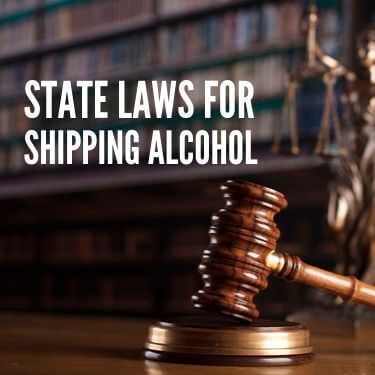
If you have a set state in mind, then this document is ideal for you, though it’s never wise to assume that this is all you need to know. Keep in mind that, even on paper, some state laws are still confusing. If you want to remove all doubt, your best option would be to contact the authorities for your chosen states.
As we’ve also touched on, working with a shipment company that already has some understanding of individual state laws can save you even that effort. They’ll be able to tell you straight away what alcohol and amounts you can and can’t ship in any given state.
During your research, the chances are that you’ll come across mention of something called the Webb-Kenyon Act. Passed in 1913, this is the very act that first prohibited the interstate transportation of alcohol and permitted state regulation of alcoholic beverages. Originally intended to provide federal support to state-specific prohibition efforts, you can guarantee that all these state-based alcohol shipment struggles started here.
The Act itself became irrelevant with the adoption of national prohibition in 1933, but its impact on individual state policies is still evident today. That said, times are gradually changing as a need for more free movement of alcohol arises. The prevalence of online alcoholic beverage companies, for instance, makes stringent and inflexible policies difficult to both monitor and maintain.
The implications of change can be seen most greatly from the Granholm v. Heald 2005 case we mentioned previously, adjustments were made to the ease with which companies were able to ship wine. While beer and liquor are still fairly complex to move, the implications of this alteration can also be seen here, with further improvements yet to come.
Still, understanding the Webb-Kenyon Act itself provides some historical perspective on interstate regulations. Knowledge is vital, especially when bulk shipping alcohol.
Legal stuff aside, you may be wondering whether shipping alcohol in bulk quantities is even safe or advisable. This is especially vital when you consider that an accident could cost you in both lost stock and a damaged reputation.
The thing to remember here is that alcohol is an incredibly flammable substance. Even a small accident during transportation could, therefore, lead to catastrophe if you don’t take proper precautions. That said, there’s no reason why even large quantities of alcohol can’t be safe when legally shipped and appropriately handled.
To make sure your alcohol shipping process is as safe as it possibly can be, it’s worth asking yourself questions including -
Answering these questions will give you an idea of how safe your shipment methods are right now, and any improvements that you could make to improve.
In general terms, proper packing using the methods already mentioned is the most important way to keep this process safe at all times. Alcohol stored within secure tanks or drums is a lot less liable to leakage issues. Equally, wine bottles stored within correct boxes and bubble wrap are the least likely to experience problems during even international shipping.
A lot of the time, safety in bulk alcohol shipments also just comes down to your chosen shipping company. Some transportation firms will ship your alcohol as it is without even considering improved safety processes. By comparison, a shipping company that also offers a complete end-to-end logistics package is liable to take extra precautions if they do see gaps in your safety. That makes accidents a lot less likely, and it increases the chances that your alcohol will arrive in one piece.
R+L Global Logistics partners with experienced carriers that specialize in alcohol shipments. Safety is the top concern when choosing a qualified carrier to handle your shipment.
Shipment cost is a pressing priority to any company, especially with potentially expensive products like alcoholic beverages. Luckily, we aren’t going to leave you hanging here,.
As you might guess, costs are always going to vary. For one, individual shipping companies will offer different prices depending on everything from their scale to the services they offer. And, of course, your shipment needs themselves are going to make a significant difference here.
Alcohol is heavy and somewhat complex to handle, so prices here do tend to be relatively high. Still, you may find that you can bring those costs around to a reasonable rate by considering essentials like -

Note that shipping alcohol across state lines can be particularly pricey, as a shipment company will need to consider things like standard truckload shipping fees as well as additional charges due to the type of cargo. When asking about rates, then, be sure to ask specifically about alcohol rates. While some will charge the same prices per unit here as any other item, most will have a separate pricing list. Transporting alcohol requires some additional planning and liability which increases the cost of the shipping company which gets passed onto you. Being aware of this from day one makes sure that you’re aware of the costs you face.
Many companies will also cut costs for a frequent contract, so shopping around to find the best fit for you moving forward is worth your while. That way, you can sign up for long-term alcohol shipments straight off, and potentially save money in the process.
Irrelevant of price, you might be wondering how you can even go about finding a carrier for shipping alcohol in bulk. Getting this right is, after all, vital for ensuring you get the best service possible. Given how essential experience in various laws is here, you also need a company that knows exactly what they’re doing and can help you in your quest.
A few things to look out for from any shipment company include -
As with anything like this, keeping a checklist in mind is the best way to get what you want. Once you find a carrier you can trust, shipping alcohol in bulk never needs to be a bother again.
Here at R+L Global Logistics, we have precisely what it takes to make shipping alcohol easier than you’ve ever imagined. That’s because we offer a complete end-to-end service with the mission purpose of helping businesses worldwide to ship smarter.
While we don’t directly transport alcohol, we serve as your logistics partner and do the planning and logistics for you. We have established partnerships with trusted carriers that specialize in shipping alcohol. This means that we find the perfect match for your alcohol shipment based on your unique shipment and situation. Let us be your truckload shipping partner. Our other freight services include:
Whether you’re looking to transport alcohol within the U.S. or further abroad, we can stand by your side every step of the way to make it happen. As well as offering extensive experience in consumer goods (alcoholic beverages included), our logistics team will take care of everything from safe packaging to unique state regulations so you don’t have to.
Are you looking for wine transportation services from California? Maybe you're just wondering how are grapes transported? Regardless of your need, R+L Global Logistics is here to help.
These are just some of the things that make us a world-class provider in high-quality transportation and logistics solutions. To enjoy these benefits and more, give us a call at (866) 353-7178 today!
R+L Global Logistics
315 NE 14th St., Ocala, FL 34470